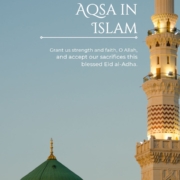Why is Masjid Al-Aqsa Important to Muslims?
Among the most revered sites in the Muslim world, Masjid Al-Aqsa in Islam holds profound historical, spiritual, and religious significance. Located in the heart of Jerusalem, it is considered the third holiest mosque after Masjid Al-Haram in Makkah and Masjid An-Nabawi in Medina. For Muslims across the globe, it represents a deep connection to their faith, history, and the legacy of prophets.
A Sacred Connection to Prophets
Masjid Al-Aqsa is often called “the land of the prophets” because many prophets of Islam lived, preached, or passed through this blessed land. Prophets such as Ibrahim (Abraham), Dawud (David), Sulayman (Solomon), and Isa (Jesus, peace be upon them) are closely associated with Jerusalem. This historical continuity makes Al-Aqsa not just a place of prayer but a living testimony to the unity of the Abrahamic faiths.
The First Qiblah (Direction of Prayer)
One of the unique aspects of Masjid Al-Aqsa in Islam is its role as the first Qiblah. Before the direction of prayer was changed to the Kaaba in Makkah, Muslims initially prayed facing Jerusalem. This early connection highlights Al-Aqsa’s spiritual centrality during the formative years of Islam and its enduring role in the practice of faith.
The Night Journey (Isra and Mi’raj)
Perhaps the most powerful reason for Al-Aqsa’s importance comes from the miraculous journey of the Prophet Muhammad (peace be upon him). According to Islamic tradition, during the Isra and Mi’raj, the Prophet was transported from Makkah to Masjid Al-Aqsa, where he led all the prophets in prayer. From there, he ascended to the heavens. This event symbolizes the mosque as a spiritual gateway and establishes its significance as a place blessed by Allah.
A Center of Islamic Heritage
Masjid Al-Aqsa has been a beacon of Islamic scholarship, culture, and civilization. Over centuries, it has nurtured scholars, hosted learning circles, and served as a hub of Islamic thought. Despite challenges throughout history, it remains a vibrant symbol of resilience and faith for Muslims worldwide.
Linking Al-Aqsa to Medina
While Al-Aqsa stands as the third holiest mosque, Muslims also recognize Medina important to Islam as the city of the Prophet Muhammad (peace be upon him). Medina is home to Masjid An-Nabawi and the Prophet’s grave, making it a city of immense spiritual weight. Together, Makkah, Medina, and Jerusalem form a sacred trio of cities that reflect the deep roots of Islamic faith.
A Symbol of Unity and Faith
For Muslims today, Masjid Al-Aqsa continues to be more than a historical landmark. It is a symbol of identity, resistance, and unity in the face of adversity. The love and reverence for Al-Aqsa reflect a shared responsibility among Muslims to protect and honor their sacred heritage.
Conclusion
The importance of Masjid Al-Aqsa in Islam cannot be overstated. It embodies centuries of history, a spiritual link to the prophets, and a direct connection to the Prophet Muhammad’s miraculous journey. Alongside Makkah and Medina, it completes the trio of Islam’s holiest sites, reminding Muslims of their shared faith and heritage. For believers, Al-Aqsa is not just a mosque—it is a sacred trust and a symbol of devotion to Allah.

